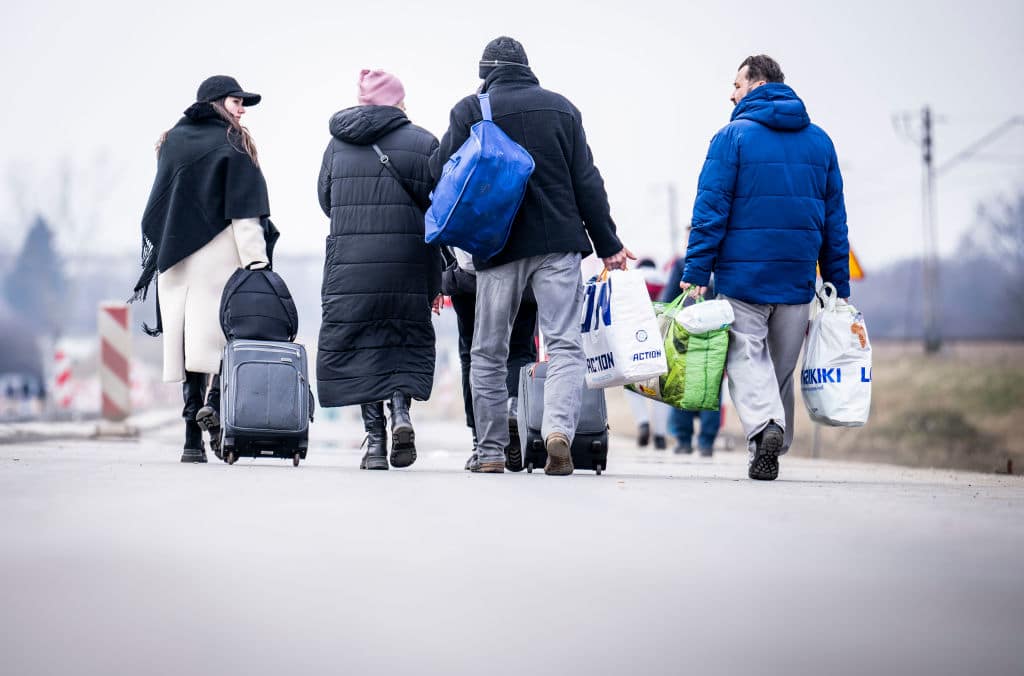Ukrainian refugees need community, language education to resettle says UBC psychologist

As the world watches hundreds of thousands of Ukrainians flee their country to escape the violence of the Russian invasion, Peter Suedfeld can’t help but think back to when he was a child in a similar situation.
The UBC professor of psychology’s mother died in Auschwitz during the Holocaust, while he and his father fled Hungary in the winter of 1945 to escape Nazi persecution of Jewish people. The then teenaged Suefeld arrived in the United States in 1945, to a world not so welcoming to non-English speaking refugees.
“Everything was in English. And until we learned English, we had some problems,” Suedfeld tells CityNews.
Advertisement
Now, some Ukrainians are looking to escape the violence in their country by coming to Canada. While the transition from one country to another is a tough and tolling decision, it’s one which Canadians can help make easier for incoming refugees, says Suedfeld.
He says educational environments, like schools, are still some of the best places to learn to adapt to a new life.
“I think the probably the most important aspect of my getting used to life in North America was going to school,” he said, adding school is how he learned English. “There you learn pretty quickly. It’s like an immersion experience, because kids tend to make relatively few allowances for the fact that you don’t know which end to hold a baseball bat.”
Related articles
- How can I help Ukraine? A list of Canadian organizations offering relief
- Ukrainians defy deadline to surrender in Mariupol or die
- ‘Absolutely right’ to call Russian attacks on Ukraine genocide: Trudeau
He says language was the key that opened many other doors to society, such as culture, work, and a sense of community.
He says Canada has come a long way in offering refugees services in their native languages to help with the transition.
Advertisement
“Now if you if you look around, you’ll find that government documents, for example, or pamphlets and so on, are available in lots of languages and probably Ukrainian or Russian,” he said. “So there’s much more support for newcomers than traditionally has been the case.”
Keeping a sense of community with their fellow Ukrainians will also be key for refugees to adapt to a new life, according to Suedfeld. This includes keeping in touch with family back in Ukraine or scattered across the globe. He also believes Canadians relatively large Ukrainian community will be an important resource for newcomers.
“The people who have been here longer can help the ones who have arrived just recently and help them get used to things help navigate the bureaucracy for things like buying a home and paying taxes and setting up a bank account,” said Suedfeld, who now studies the effects of challenging and stressful environments and experiences on mental health and behaviour.
He says while many Ukrainians will need help navigating Canadian bureaucracy, Canada shouldn’t make too many decisions for them. Refugees should be the ones choosing the best way for them to adapt to a new life.
“You have you have to treat them like normal people, which they are rather than something exotic and helpless and people who need to have decisions made for them and so forth,” he said. “You can’t lump all refugees or even all Ukrainian refugees into some kind of box like they’re all alike. They’re like any other bunch of people that have different experiences, different levels of education, different job training, different personalities and so on and so you always have to remember you’re dealing with individuals, not with some faceless, political identity that makes them all similar.”
Advertisement
Last week, Prime Minister Justin Trudeau said U.S. President Joe Biden’s description of Russia’s attacks on Ukraine as a genocide was “absolutely right,” but stopped short of directly calling it genocide himself.
Canada has placed several sanctions against Russia and some Russian individuals. Trudeau says they will remain in place as long as necessary to stop the war.
Anyone looking to help Ukrainian refugees can find a list of reputable organizations here.
